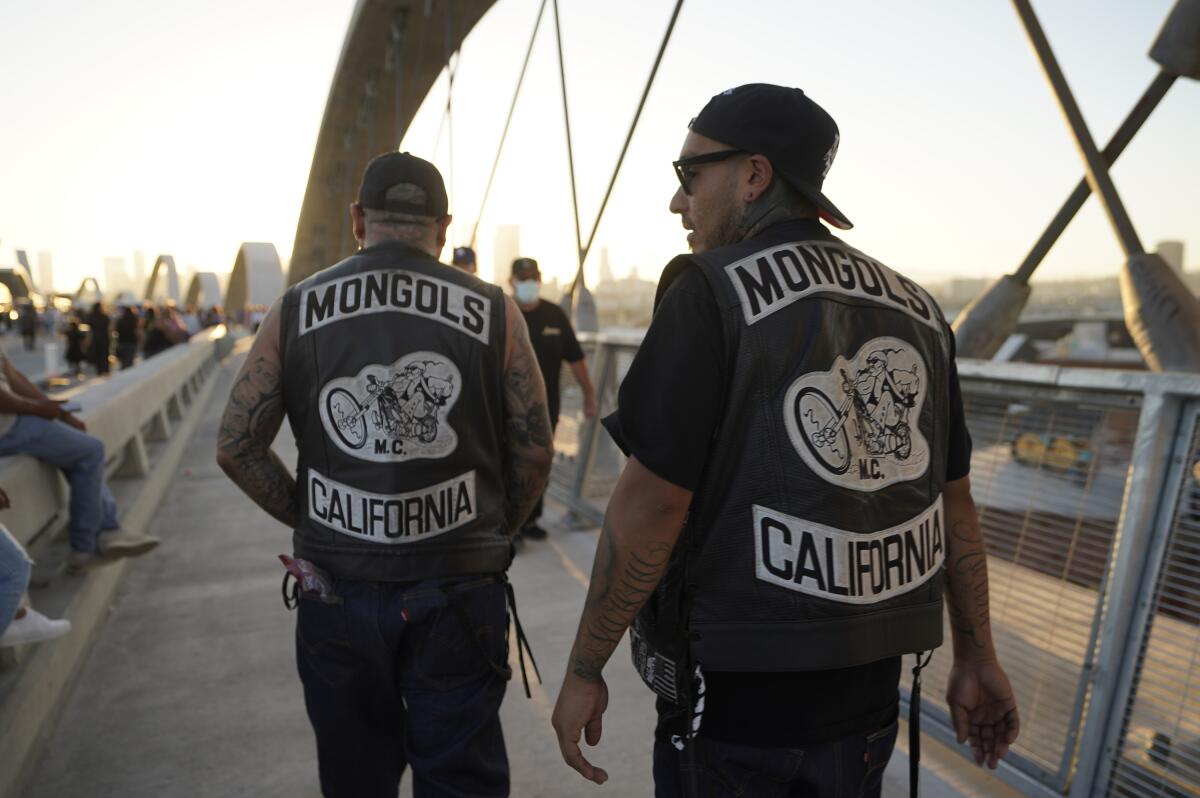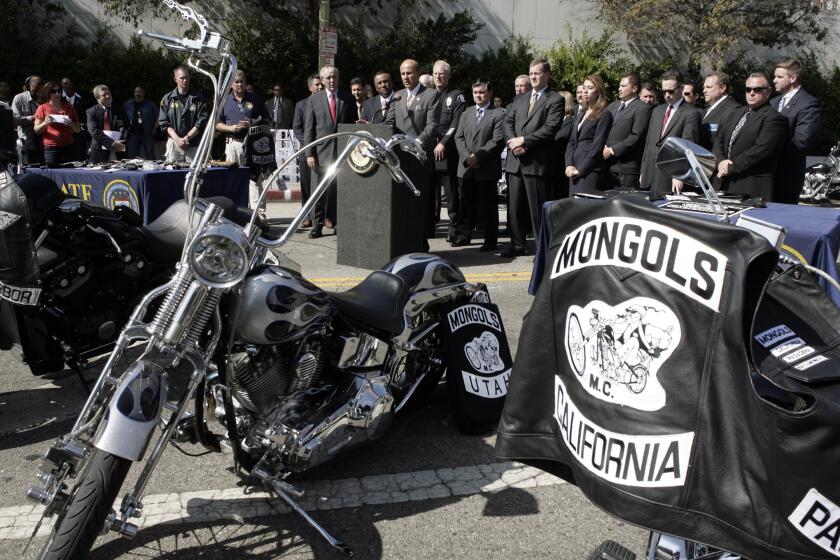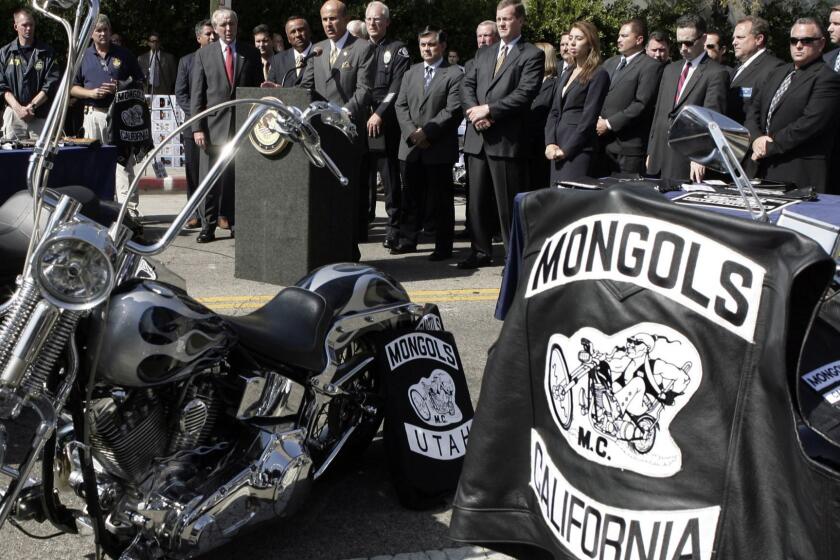Mongols biker club is denied new racketeering trial after claims its leader was informant

- Share via
The Mongols motorcycle club will not get a second chance to clear itself of federal racketeering charges after a judge last week denied its request for a new trial.
In an oral ruling from the bench, U.S. District Judge David O. Carter denied the club’s request on Thursday, said Thom Mrozek, a spokesperson for the U.S. attorney’s office for the Central District of California. A written ruling was not available Monday night.
Carter’s ruling comes nearly four years after a federal jury convicted the Mongols of racketeering in 2018, finding that the group was a criminal organization whose members had beaten and killed rivals and trafficked in drugs.
An explosive claim followed about three years later, in 2021: that David Santillan, then the club’s president, had acted as a confidential informant for John Ciccone, an agent with the U.S. Bureau of Alcohol, Tobacco, Firearms and Explosives.
On Dec. 10, 2021, Joseph A. Yanny, the Mongols’ attorney, filed a motion for a new racketeering trial.
“It is hard to imagine a more egregious invasion of attorney-client privilege or a more cavalier dismissal of due process rights,” the motion said.
Santillan had called his wife in June 2021to beg for forgiveness. He promised he’d put his infidelities behind him, get sober and be a better father.
‘Meeting with the enemy’: Was the leader of the Mongols motorcycle gang a double agent for the feds?
Three years after a federal jury convicted the Mongols of racketeering, a recording surfaced suggesting their leader had a secret relationship with the agent who led the investigation.
Unbeknownst to him, she was recording the conversation, which eventually turned to Ciccone.
“John told me already — I have one year,” Santillan said, referring to Ciccone. “One year, he’s retiring … and he can’t protect me. He told me. So we have to have an exit strategy.”
Livid at her husband — and the fact that his mistress had been harassing her and her children — Annie Santillan texted the recording to two members of the Mongols. Her husband, she wrote, “has been working with the government [this] entire time.”
“He is simply a CI,” she wrote — a confidential informant. “Or in other words, he is a rat.”
Mrozek was not able to provide further information on Carter’s oral ruling, but it appears the judge rejected the arguments surrounding Santillan’s involvement with federal investigators.
According to Law & Crime, Carter said Santillan’s recorded statements weren’t enough to offset the “horrific” killings at the heart of the 2018 trial.
The judge said the allegation against Santillan “has a stench to it,” but there was no evidence to support the claim, the website reported.
And the notion that the Mongols could be acquitted in another trial “is something this court has a very difficult time believing,” Carter said, according to the website.
“This case is horrific concerning the magnitude of the murders and the narcotics dealing, and the war between the Hells Angels and the Mongols,” said Carter, according to the website. “There are too many murders.”
In a statement to The Times on Tuesday, Yanny said he and his clients were “very disappointed in the decision.”
“It’s our belief that the decision is incorrect,” the attorney said. “It’s understandable why a judge would be reluctant to tarnish the reputation of a career federal agent. Similarly we understand the judge’s reluctance to openly label an individual a ‘cooperator’ with the potential consequences of that label.”
But Yanny argued that the judge used an incorrect standard.
“There is a wealth of evidence in the record that there was an inappropriate relationship between the lead government agent and the Mongols leader in charge of the case and that the case suffered from it,” he said. “In such settings a new trial should be granted at a minimum.”
A federal judge Friday slapped the Mongols motorcycle club with a sizable fine and probation as punishment in a racketeering case, but rebuffed another attempt by prosecutors to strip the notoriously violent group of trademarks it holds on its logo.
Founded in Montebello in the 1970s, the Mongols are what the ATF has dubbed an “outlaw motorcycle gang,” along with the Hells Angels, Pagans and Vagos, among others. Though their members insist they are little more than social clubs, authorities say they murder one another in bitter rivalries and deal drugs and guns.
A short, well-built man with tattoos that climbed above the neck of the collared shirt and blue suit he wore to court, Santillan, known as “Little Dave,” testified this year that he joined the Mongols in 1997. A year later, he was admitted to “Mother Chapter,” a governing body within the club.
After spending a year in the Lompoc federal penitentiary for mail fraud, Santillan returned to the club in 2000. Ten years later, he was tapped as president.
After his wife circulated what he called “the infamous video” and labeled him as an informant, Santillan was stripped of his title and excommunicated, he said in court.
In a Sept. 29 motion, federal prosecutors pushed back against the claims of Santillan’s improper involvement with the government.
“Defendant’s Motion claimed that its national president was a confidential informant who provided trial strategy to the government during trial,” according to the motion. “That was not true. Over the course of several months and days of hearings, no witness or piece of evidence supported it.”
Prosecutors noted that nearly 10 months had passed since Yanny filed the motion for a new trial, and that years had passed since the original trial and convictions.
“The Court has permitted multiple days of testimony, spread over the course of several months, and defendant did not meet its burden to show new evidence or any of the elements required for a new trial,” prosecutors said.
More to Read
Sign up for Essential California
The most important California stories and recommendations in your inbox every morning.
You may occasionally receive promotional content from the Los Angeles Times.
















